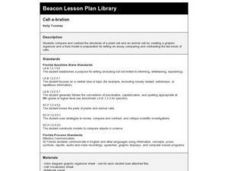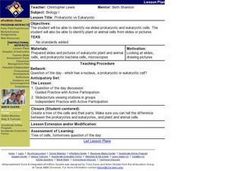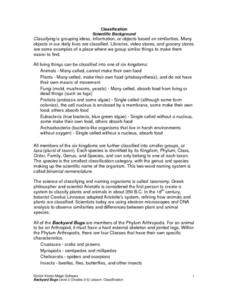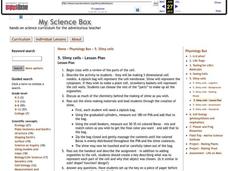Curated OER
The Cell Cycle
In this biology worksheet, students label 9 diagrams with the correct names. They also write short answers to 6 questions that follow.
Curated OER
Cell-a-bration
Fifth graders study the structures of a plant cell and animal cell. They create a graphic organizer and a food model. Finally, they write an essay comparing and contrasting plant and animal cells.
Curated OER
Prokaryotic vs Eukaryotic
Students identify via slides prokaryotic and eukaryotic cells. They identify plant or animal cells from slides or pictures. Students are given the question of the day. They are asked which has a nucleus, a prokaryotic or eukaryotic...
Curated OER
The Living Environment
Sixth graders show what they know about plant and animal cells. For this cell project lesson, 6th graders get to choose a project based on their learning style. They can create a visual representation of cells, auditory forms, or build a...
Curated OER
How do plant & animal cells make and use energy?
Young scholars show the relationship between the need for plants to undergo photosynthesis in order to generate oxygen. They see the flaws associated with this thinking because of the lack of CO2 and H2O and lack of sufficient gravity in...
Curated OER
Inside of a Cell
In this cell worksheet, students complete a graphic organizer by determining what organelles are found in plant or animal cells and their functions.
Curated OER
Seeing Cells
Sixth graders study living cells and their functioning units. In this cell instructional activity students color cell diagrams, answer questions and discuss the differences between plant and animal cells.
Curated OER
Plankton in the Air
Here is a lab activity adequate for use with any full lesson plan on environmental factors that shape animal adaptations or marine animal characteristics. Pupils will discuss the role plankton plays in the environment and filter-feeding...
Curated OER
Life Cycle: Diversity in a Balance 4th Grade Workbook
In this life cycle workbook, 5th graders examine plant and animal cells, classification of organisms, human biology, photosynthesis, and natural environments. 21 different activities make up the Life Cycle Workbook.
Curated OER
Cells
In this biology worksheet, students use the clues given at the bottom of the sheet to complete the crossword puzzle on cells. There are 22 clues to solve in the puzzle on cells.
Curated OER
Cell Cookies
Fifth graders, in groups, create a plant or animal cell out of cookies, frosting, and candy pieces.
Curated OER
The Virtual Electron Microscope
Students explore the world of the very small using a Flash plug-in Virtual Electron Microscope. They complete and discuss an activity in which unknown samples are placed under the computer simulated microscope to determine where the...
Curated OER
You...Instead of the Onion Skin
Students observe their own epithelial cells from the inside linings of their cheeks using DigiScope technology. They prepare a slide with both onion cells and epithelial cells and make an illustrated booklet for a PowerPoint presentation...
Curated OER
Design a Plankton
Students explore animal and plant adaptation. In this ecosystems science lesson, students view websites to gain information about plankton and its interdependence within ecosystems. Students identify ways in which plankton...
Casimir Middle School
Biological Classification Worksheet
Classify living things with a set of worksheets that has pupils sorting and indentifying living and non-living things. Learners use the worksheets as a basis for finding their answers.
Curated OER
Regents High School Examination: Living Environment 2005
The 2005 version of the Regents High School Examination in the area of ecology is as comprehensive as previous years' exams. It consists of 40 multiple choice questions on everything from the structure of DNA to the interactions within...
Serendip
Introduction to Osmosis
A chicken egg is a very large cell—perfect for investigating osmosis! Scholars conduct an experiment with vinegar and eggs that helps them understand the process of osmosis. They follow the activity with an in-depth look at osmosis...
Curated OER
Looking At Plants and Animals
Even though the presentation is connected to a particular textbook, it could be used in any lower elementary classroom to review plants. There are diagrams and colorful graphics that make it attractive and engaging.
Open Oregon Educational Resources
General Biology I: Survey of Cellular Biology (Mt Hood Community College Biology 101)
From the scientific method to the function of a cell, the eBook has it all. A useful resource provides a free biology textbook with a focus on context. The text begins with an overview of the process of scientific inquiry and biology...
Curated OER
Backyard Bugs
Explore the concept of scientific classification and the similarities and differences between plant and animal species. Your class will participate in hands-on activities by investigating dichotomous keys and classifying their shoes. To...
Curated OER
Cell Community
Seventh graders use technology to review cell structure and function. In this cells less, 7th graders review the parts and functions of a cell, and use photography/video and PowerPoint to enhance their explorations.
Curated OER
The Cell Theory
In this cells learning exercise, students review how the cell theory was developed. Students review the structure and function of cell structures and active transport. This learning exercise has 30 fill in the blank questions.
Curated OER
The Giant Cell
After actively participating in a unit on cells, the students act out and become the organelles. They will act out and explain the functions of what each of the organelles do for the cell.
Curated OER
Slimy cells
Students study the parts of a cell. In this chemistry instructional activity students complete an activity in which they make as much slime as they want.
Other popular searches
- Plant and Animal Cells
- Plant vs. Animal Cells
- Animal Cells Plant Cells
- Animals and Plant Cells
- Animal & Plant Cells
- Plant Animal Cells
- Compare Plant Animal Cells
- Label Plant and Animal Cells
- Plant vs Animal Cells
- Plant Animal Cell Diagram
- Plant Animal Cell Organelles























